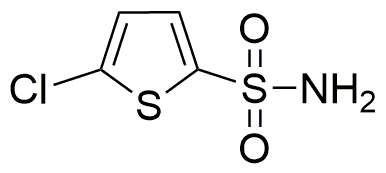5-Chloro-2-thiophenesulfonamide is widely utilized in research focused on:
- Pharmaceutical Development: This compound serves as a key intermediate in the synthesis of various pharmaceutical agents, particularly those targeting bacterial infections, due to its sulfonamide group which is known for antimicrobial properties.
- Agricultural Chemicals: It is used in the formulation of agrochemicals, specifically as a fungicide, helping to protect crops from fungal diseases, thereby enhancing agricultural productivity.
- Material Science: The compound is explored in the development of novel materials, including conductive polymers, which can be applied in electronic devices, offering improved performance compared to traditional materials.
- Analytical Chemistry: It is utilized as a reagent in various analytical methods, aiding in the detection and quantification of other compounds in complex mixtures, which is essential for quality control in laboratories.
- Research in Organic Synthesis: This chemical is a valuable building block in organic synthesis, allowing chemists to create more complex molecules efficiently, thus streamlining the research and development process in various fields.
General Information
Properties
Safety and Regulations
Applications
5-Chloro-2-thiophenesulfonamide is widely utilized in research focused on:
- Pharmaceutical Development: This compound serves as a key intermediate in the synthesis of various pharmaceutical agents, particularly those targeting bacterial infections, due to its sulfonamide group which is known for antimicrobial properties.
- Agricultural Chemicals: It is used in the formulation of agrochemicals, specifically as a fungicide, helping to protect crops from fungal diseases, thereby enhancing agricultural productivity.
- Material Science: The compound is explored in the development of novel materials, including conductive polymers, which can be applied in electronic devices, offering improved performance compared to traditional materials.
- Analytical Chemistry: It is utilized as a reagent in various analytical methods, aiding in the detection and quantification of other compounds in complex mixtures, which is essential for quality control in laboratories.
- Research in Organic Synthesis: This chemical is a valuable building block in organic synthesis, allowing chemists to create more complex molecules efficiently, thus streamlining the research and development process in various fields.
Documents
Safety Data Sheets (SDS)
The SDS provides comprehensive safety information on handling, storage, and disposal of the product.
Product Specification (PS)
The PS provides a comprehensive breakdown of the product’s properties, including chemical composition, physical state, purity, and storage requirements. It also details acceptable quality ranges and the product's intended applications.
Certificates of Analysis (COA)
Search for Certificates of Analysis (COA) by entering the products Lot Number. Lot and Batch Numbers can be found on a product’s label following the words ‘Lot’ or ‘Batch’.
*Catalog Number
*Lot Number
Certificates Of Origin (COO)
This COO confirms the country where the product was manufactured, and also details the materials and components used in it and whether it is derived from natural, synthetic, or other specific sources. This certificate may be required for customs, trade, and regulatory compliance.
*Catalog Number
*Lot Number
Safety Data Sheets (SDS)
The SDS provides comprehensive safety information on handling, storage, and disposal of the product.
DownloadProduct Specification (PS)
The PS provides a comprehensive breakdown of the product’s properties, including chemical composition, physical state, purity, and storage requirements. It also details acceptable quality ranges and the product's intended applications.
DownloadCertificates of Analysis (COA)
Search for Certificates of Analysis (COA) by entering the products Lot Number. Lot and Batch Numbers can be found on a product’s label following the words ‘Lot’ or ‘Batch’.
*Catalog Number
*Lot Number
Certificates Of Origin (COO)
This COO confirms the country where the product was manufactured, and also details the materials and components used in it and whether it is derived from natural, synthetic, or other specific sources. This certificate may be required for customs, trade, and regulatory compliance.


